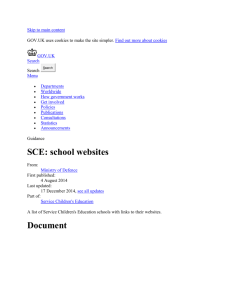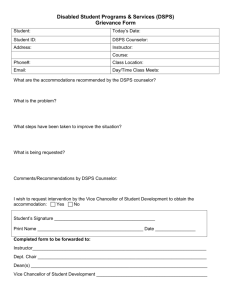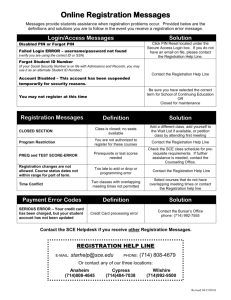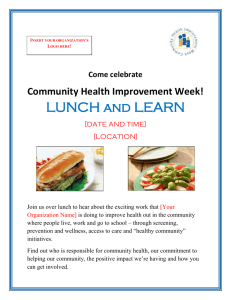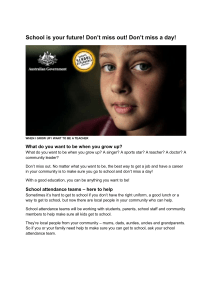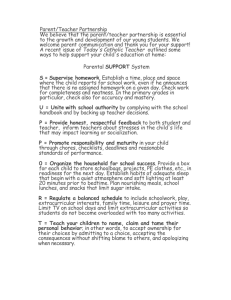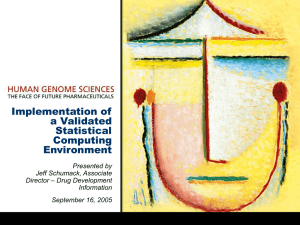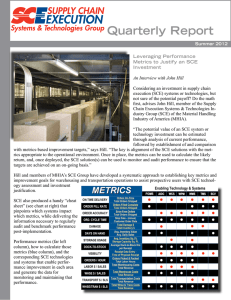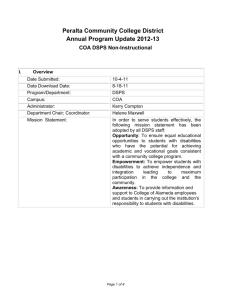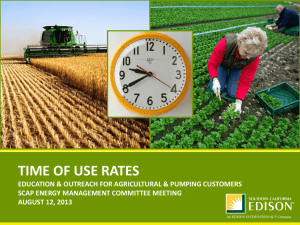Parent and Support Person Orientation
advertisement
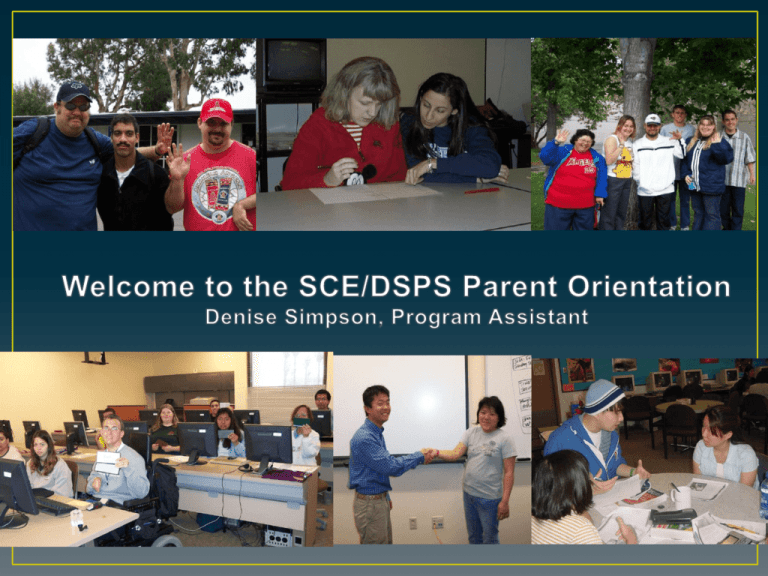
Please raise your hand if you think your child is an adult. It is often difficult to view our children who are 18 years old or older as adults, but legally they are and they will be treated as adults when they enroll in postsecondary education classes and programs. Anna Curnes Disability Specialist Adam Gottdank Disability Specialist Our district is comprised of two credit colleges and one noncredit school. Students can enroll in any or all three institutions. Anna and Adam assist students in setting up accommodations and enrolling in special classes for the School of Continuing Education. We create and deliver all classes to prepare students to work and live more independently. Goal: To help students prepare for their next step. We try to tie all aspects of our postsecondary education program with employment. We encourage students to view their classes as a job. They must have good attendance, they must call in when they are going to miss and they must participate fully while in class. Student Parent/Support + SCE/DSPS SUCCESS Research indicates that due to the nature of their disabilities, students with intellectual disabilities will be most successful with natural supports, which can include but not be limited to parents, family members and friends (Zhang, Wehmeyer & Chen, 2005). As we teach students to self-advocate and to live and work more independently, we hope to provide assistance to you as you learn your new role in your child’s life. Parenting Processes Model Attachment Striving and Mastery Interdependence (Edward, 2002) It is important to examine the role of the parent. One model that might help us see the changes that we experience is the Parenting Processes Model. The next few slides will show some of the steps that parents often go through. It is my hope that we will see these steps as healthy transitions for our students. Maslow hypothesized that children will thrive when they are confident that there will be no unexpected changes and nothing will cause harm. As babies enter the world, they are completely dependent on their caregiver. Through their development they begin exploring their world, but do so confidently when someone is there to make sure they will remain safe. During this developmental stage, it is the parents or caregiver’s responsibility to maintain a safe world for their child to explore. Parents must observe and assess the level of assistance and intervention their child needs, being careful not to become overly intrusive, or discouraging their children from trying new things. It is easier to tie your child’s shoe laces rather than teach them to tie their own shoes, but when you patiently wait as they master tasks they gain independence and confidence. As children enter preschool leave their parent’s immediate presence, or as they learn to play a new sport for the first time, or as they begin riding the bus or get their first job, you, the parent or support person, must balance appropriate support and encouragement. As the child’s confidence levels increase, their parents slowly begin to let go and watch carefully as their child explores and experiments. As students are given more independence, they must also experience the consequences of their choices. This is a perfect time to allow students to make more decisions for themselves. For example, a student can determine their own bedtime, but they must still be required to go to work or school the next day even if they are tired from staying up too late. Students can become responsible for making their own breakfast and lunch and doing their laundry. They must learn the importance of going to work or school even when their friends or family are all going to a movie. There are many ways students can still live with their parents/support and still become more independent. Courses are set up like traditional college classes. A sample schedule might be: Have your child make every attempt to not miss any classes, but if it is necessary to miss, have them call in the absence. All special classes begin in the Fall trimester and conclude at the end of the Spring. We do all students to enroll throughout the year if space permits. Students in special classes are unsupervised during the one hour lunch break and fifteen minute breaks that each class gives. If a student only has a morning or an afternoon class, they are permitted to come at lunch time to eat with friends, but they cannot hang around on campus if they do not have a class. Go to www.sce.edu. Mouse over Programs (don’t click) and you will see Disabled Students On the DSPS webpage you will see a list of courses with descriptions. • Classes are experiential and hands on learning. When you miss class, you miss important information to help you obtain your life goals • We want you to gain good work habits • The classes have long waiting lists, too many absences could lead to losing your place in class. A consequence of poor attendance could mean being dropped from class and added to the waitlist, just as it could be the loss of a job in the working world. Students should work with their families to schedule family vacations during school breaks. • Show up to class on time • Call in when absent • Be respectful to instructors, staff and other students • Follow the student code of conduct (Rules) • Come to class prepared • Complete class assignments and homework • Appropriate use of computers • Participate in class • Try hard • Ask for help Instructors challenge students to achieve their personal best. When they have met the objectives of the course to the best of their ability, there is no need for them to repeat the course. In addition to learning the specific subject matter for the course, students in postsecondary education (pse) programs increase their independence skills because they are responsible to get to and from school and to and from class without assistance from the staff and faculty. They are challenged to become more independent in their personal lives by taking on more responsibilities at home. They learn to problem solve, resolve conflicts and advocate for themselves. • • • • California ID Emergency card (list of medications & phone numbers) Personal needs School supplies (pencil, paper, notebook, etc.) • Instructor will tell students on the first day of class if there are specific supplies needed for that class. • Lunch or money to buy lunch • Money for emergencies (not too much, though) • Students are responsible for their own belongings Help your student develop good organizational skills so they will come to school prepared. Teach them to be responsible for their own materials. Refrain from contacting instructors, but rather put the responsibility on the student. Ask them what they need. We are not permitted to request information on medications, but we can keep the information in our database if a student chooses to provide us with it. It is a good practice for students to carry medical information with them. Many of our students have a difficult time saying NO to friends or strangers who want to borrow money or items such as cell phones so we encourage students not to loan money or personal belongings to anyone. We want all students to learn to be responsible by bringing their own lunch and school materials. We have had a few occasions where students have had money, wallets, iPods and cell phones taken. • All NOCCCD (North Orange County Community College District) students are expected to follow the student code of conduct. • You can view the policies at www.nocccd.edu. Students are also given “Student Guidelines”, which is a version that is easier for students to understand. Help us to teach students how to behave as college students and adults. Adults experience positive and negative consequences for actions. Because we are part of a Community College District, our students are required to abide by the districts code of conduct. Depending on the nature of the violation, if a student violates the code of conduct they will either be removed from class for up two class sessions and/or be required to meet with a Disability Specialist, Program Assistant, Program Director or Dean. We often use Behavior Contracts, an agreement between the instructor or specialist and the student, to help the student be successful in complying with the district’s code. • Our campus is proactive and conducts many practice drills throughout the school year. • Though not mandated, students are encouraged to have a list of medications and an extra dose of their medications with them at all times. • Students should carry a list of people to contact if they need to go home early or miss their bus. Students who take ACCESS should have OCTA’s phone number and their rider ID #. • In My Gateway, students can enter their phone number to receive text messages to alert them to campus closures or emergencies Go to www.sce.edu and then click on the My Gateway icon. Enter student ID# or ssn (no dashes). PIN is student’s 6-digit birthdate and then go to the Personal Information channel In the Personal Information Channel, select “Set Text Message Alert Preference Make new friends Get to know the Campus Develop living, vocational and personal goals Begin increasing independence Encourage and allow student to spend time with new friends outside of class. Provide opportunities for students to gain independence at home. Each student will meet with a counselor to discuss progress from current classes, evaluate goals, select classes for the next year to help student obtain their goals. • Meetings occur May or June • Students are given a letter information about the meetings and instructions • Family, caseworkers, and/or other support are welcome to join in this meeting Students sign up for appointments during class, but they are permitted to invite parents and support people to the appointment, if they choose. As the California state budget continues to tighten, Community Colleges are required to reduce their offerings. In an effort to serve more students, we are trying to offer students up to 15 hours of class per week. Extracurricular Activity Come and see the opportunities available to you in the community: Supported Employment Agencies Supported Living Agencies Recreational Programs Advocacy Groups and information Provide support and encouragement. Learn what resources that are available to adults with disabilities. Extracurricular Activity When students are able to navigate their world independently, new doors are open to them. To learn more about our Mobility Training Program, email mobility@sce.edu or call our DSPS office. “Traveling the World One Bus at a Time” Extracurricular Activity C2C – College to Career WAIII – Workability III C2C WAIII Must be eligible for Regional Center Can be a Regional Center client, but not required Must be eligible for Department of Rehabilitation Must be eligible for Department of Rehabilitation Students enroll in classes or participate in work experience activities to prepare them for a job Students are ready for a job and receive support in preparing for and obtaining a job Parents can assist in finding the right job and maintaining long-term employment. For more information email jobs@sce.edu or call DSPS office. Extracurricular Activity Navigating Resources for Adults with Disabilities September 12 – October 24, 2011 •A Parent’s Role in College Life •Supporting my Adult Child as they Gain Independence •College vs. High School •Eligibility for Service Agencies •Supporting my Adult Child as they work with their Regional Center Case Manager •Parent to Parent Support •Independent Living Services •Work Options/Supported Employment Extracurricular Activity Parent Workshops November 2, 2011 at 5:30 Anaheim What is happening in SCE/DSPS? Future possibilities and Challenges Best Practices—Parents Share What’s Working and What’s Not How can SCE/DSPS improve?

